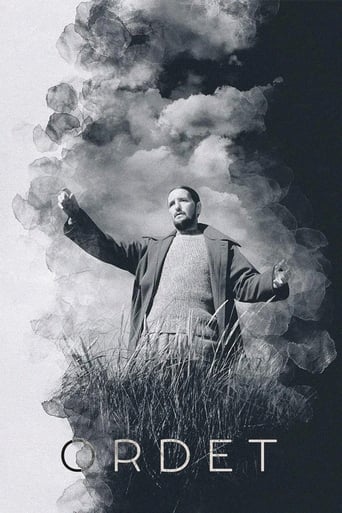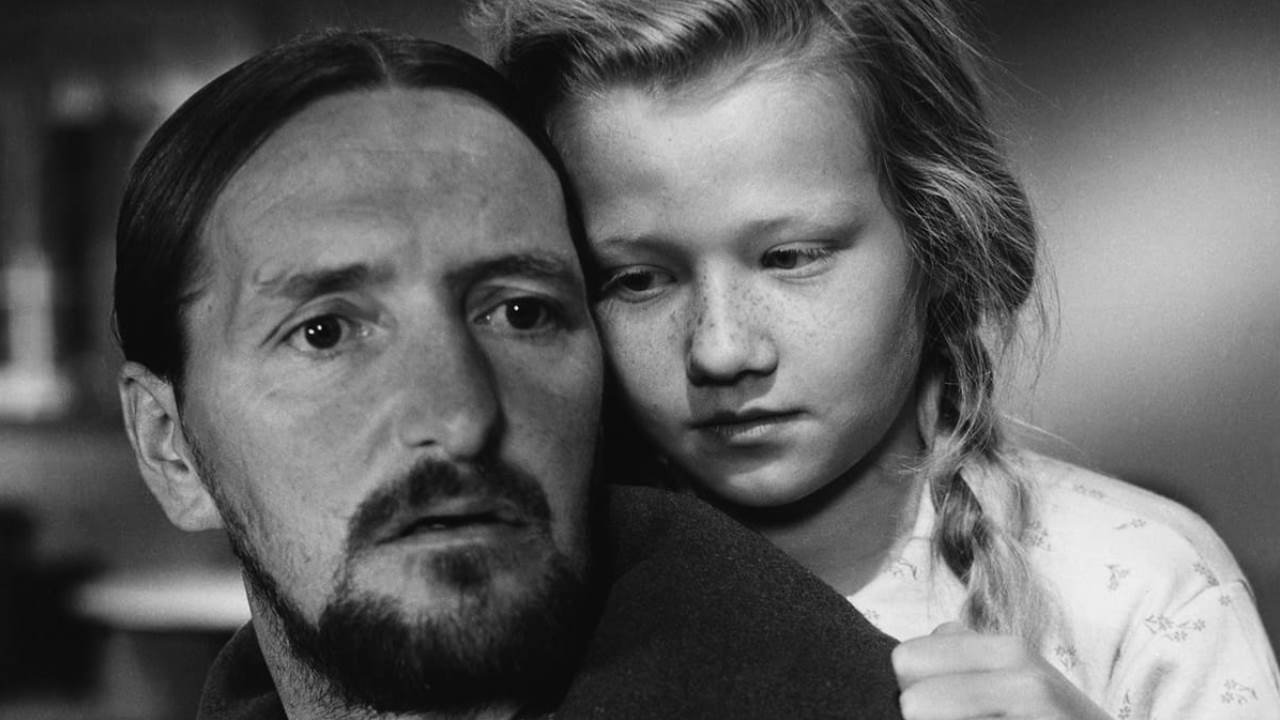Brian Berta
Ordet can be slow moving at times. However, if you keep watching it, you will be in for a treat. It can easily suck you in and give you an amazing experience. I'm not sure if I'd call it suspenseful though like I've seen some people do. I think that simply calling it engaging and well-directed is a better description of my experience with this film.This film centers around the conflict between the Borgen family and the Peterson family. The devout widower Morten Borgen has 3 sons. The first one is named Johannes, who went insane and believes that he is Jesus Christ. His oldest son is named Mikkel, who despite having no faith, is happily married to his wife Inger, who is pregnant, but in poor health. His third son, Anders, is in love with the Peterson's daughter, Anne. However, her father, Peter, refuses Anders proposal as they're not of the same faith. A long night leads to conflict between the 2 families.The best scene in the film is when Morten tries to convince Peter to let Anders marry Anne. They have to wait for him to finish his prayer meeting with his congregation, and after everyone leaves, Morten and Peter talk alone. Their conversation starts out peaceful and mature at first as Morten raises several good points in hopes of convincing Peter. However, after Peter enrages him in a shocking twist, Morten wants nothing to do with him and he takes Anders and leaves their house. This scene gives the viewer a lot of insight into the character flaws of Peter and it gives the viewer a different impression of him. This scene lingered on with me after viewing the film for that reason.I also found Inger's pregnancy very disturbing and hard to watch. Even though the doctor's work was covered up by a sheet, I still found it to be a disturbing sequence. This scene was made disturbing by the doctor's facial expressions, and the pain that Inger showed throughout the ordeal. While the doctor operated on her, her house seemed lifeless as the lighting was very dim and their house seemed dull. This scene was also made powerful with the way how Inger's family reacted to her condition. They seemed depressed and worried throughout it. For instance, Morten didn't seem to be effected that much by Johannes' ramblings. He would slowly pace around his house all the while impatiently waiting for the doctor to finish his operation. Occasionally, he would talk to a family member who walked by him, but he seemed pretty lifeless throughout the sequence. This sequence was slow, and it took up a pretty big portion of the film. However, I wasn't bored by it, because of director Carl Theodor Dreyer's great directing.As great and engaging as the film can be at times, it can sometimes be a difficult wait getting to the good scenes, because the movie has pacing issues. These issues are present in its first act where it feels very slow moving and, for the most part, uninteresting, compared to the latter half. There were a couple interesting scenes in the first act such as the opening scene, but those scenes were very few and far in between. Some people complained that the first part of the film was boring. However, I wouldn't say that I was bored by it. It just made me grow impatient as I wanted to get to the good parts.Based on the reviews I've read of this film, I know that I'm in the vast minority here, but my other issue with the film is with its ending. I found it to be the weakest part of the film. Now, credit where credit is due, it was pretty surprising. Also, it gives a bit of ambiguity to Johannes' character. That's what I liked about its ending. As a whole, however, it didn't do much for me. I really hate the fake-death cliché that so many movies do. I like films which aren't afraid of having a tragic ending much more. On my first viewing of the film, I found Inger's 'death' to be surprising and sad. However, on my 2nd viewing, the pregnancy sequence didn't have that much of an impact on me as I already knew that she would survive. If the film would have had a tragic ending instead, that scene would've likely effected me a lot more.In conclusion, this was a well-made film that had the power to engage me quite a lot with Dreyer's great direction and writing. Dreyer is clearly a talented director as is evident with this film. Even though this film had a few flaws, I'm still interested in checking out more of Dreyer's films, because several of them made it onto Sight & Sounds' "Greatest Films of All Time" list in 2012. I'll make sure to check some of them out in the future.
wgrange
An astounding movie, just breathtaking at times. It is reminiscent of another Danish movie, "Babette's Feast," which likewise had religion as its theme, depicting the impact of Christianity on average people. Like that movie, "Ordet" is by no means preachy, and at times it is very funny. The cinematography is remarkable, because the focus is almost always within small, interior spaces; the lighting is stunning, and the editing so coherent that your attention is always focused on the main action. And what is the action? Human life and its imponderable joys and sorrows. The acting represents some of the director's approach to authenticity at its most refined cinematic development. Dreyer has created complicated family relationships and allows them to play out with clarity and an guilelessness rarely seen in most movies. No wonder it has won so many prizes. "Ordet," which means "the word," qualifies as a "masterpiece," though that term gets kicked around too often. It is also a "profound" movie, which means it examines the root basics of human life. It is one of the best movies ever made--at least, in this viewer's opinion.
sarahrejoice
In viewing "Ordet", a Danish film directed by Carl Th. Dreyer, one can scarcely avoid perceiving a religious theme. However, peering beyond the surface, it is also clear that the film's theme is significantly more complex, and exhibits an underlying existentialism, as well as a series of conflicts which relate to love, passion, society, and family. The latter elements lend an altogether human aspect to the film, allowing even the religious facets to convey the doubts and skepticism associated with human nature.In the final scene of "Ordet", the setting is a funeral in the home of Mr. Borgen, the grandfather of the farm on which the deceased (Inger) lived and worked as the daughter-in-law. This scene is characteristic of the style utilized throughout the film, which has been referred to as both transcendental and expressive inner realism. In both interpretations, conventional perceptions of reality are defied and normalcy is at odds with disparity. Dreyer can, perhaps, be credited with moving beyond defiance to a thorough redefinition of realism. This is evident in his focus on the inner struggle of his characters, rather than simply the societal norms with which they were expected to conform.As a spectator, "Ordet" affected me emotionally by emphasizing the fulfillment associated with a mortal existence in which miracles are defined by the value we place on earthly and otherwise ordinary experiences. The characters of this domestic drama convey a sense of familiarity through their interactions, and their struggles are tremendously relatable. As noted by Dreyer at the end of his screenplay, "spectators must gradually and carefully be placed in an emotional state like that of guests at a funeral", an effort which was visually achieved through long shots and slow camera movements. On an intellectual and emotional level, this movie is accessible to the ordinary, yet thought- provoking to the philosophical.
Tim Kidner
I watched this very late at night on UK TV, when tired and drunk, many years ago. I remember very clearly how it had a very moving, powerful climax. Now sober - and wiser etc, I got it on DVD - it had less of an effect, though the trepidation of something arising meant the final 20mins or so was quite nerve-racking. Then, there was the 'does she/ doesn't she'? flitting back and forth in my mind. Of course this belies medical and logical resurrection which leaves only a spiritual one. It seemed unsettling and unsatisfactory almost that she simply wakes up, though it was quite well realised. If that happened in a lesser film without the religious and moral issues being thrashed out then it would be meaningless and a waste of time.Whichever way you want to look at it, those scenes are very moving. The steady, thoughtful pace, the small but significant issues that raise the saga beyond period drama all lead to this. The simplicity in design, cinematography, dialogue all bring this anticipation....we have to see what will happen, even IF anything happens.To a not terribly devoted Christian, it does reveal to me that a unification in prayer, thought and resolving of family disagreements and neighbourly dispute all added to a wave of human love and power. Whether that would have pulled her through or not is the BIG question, of course. I haven't used God's name in that sentence; maybe I should have - but it's a film! I'm viewing Christians who seem to interweaving moral judgements far too tightly into the big issues that affect them. Of course I'm going to say that - I'm of a different period, country, culture and watching a director's version of his interpretation of what he had in mind. They're too removed from my reality to strike a chord with me.My point has always been that I know other people of intelligence see deep and meaningful qualities, spiritual and morally, within it. I did too, and still do. I'm not likely to think any deeper of its intentions or qualities, other than it's a very good film and would recommend it to others, if I thought their tastes could be open to it.Lastly and not knowing where to put this in, I also found it baffling and a trite annoying that the two neighbours' opposing, yet "same" religion wasn't better defined. But - I can see many gremlins and questions being raised if they had; there's always going to be someone of either, or another faith saying things like 'we don't think that way' etc. It's like a location that's characterised very specifically and is named - someone's going to want to sue someone for slander....I also found it easier to place Johann's severely distorted and potentially disruptive over-delusional ramblings - his witterings add sincerity and meaning to, in particular, the priest and the doctor, as well as to their importance. Without these distractions the film would be too earnestly religious, for me at least. It showed the fine line between a force that helps people and gives strength and one that was in fact a real danger - as fanaticism is in any area of life.


 AD
AD




